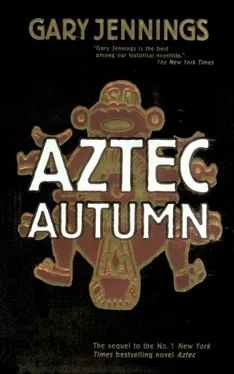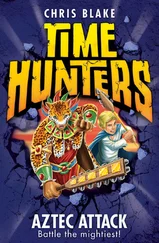Gary Jennings - Aztec Autumn
Здесь есть возможность читать онлайн «Gary Jennings - Aztec Autumn» весь текст электронной книги совершенно бесплатно (целиком полную версию без сокращений). В некоторых случаях можно слушать аудио, скачать через торрент в формате fb2 и присутствует краткое содержание. Жанр: Старинная литература, на английском языке. Описание произведения, (предисловие) а так же отзывы посетителей доступны на портале библиотеки ЛибКат.
- Название:Aztec Autumn
- Автор:
- Жанр:
- Год:неизвестен
- ISBN:нет данных
- Рейтинг книги:4 / 5. Голосов: 1
-
Избранное:Добавить в избранное
- Отзывы:
-
Ваша оценка:
- 80
- 1
- 2
- 3
- 4
- 5
Aztec Autumn: краткое содержание, описание и аннотация
Предлагаем к чтению аннотацию, описание, краткое содержание или предисловие (зависит от того, что написал сам автор книги «Aztec Autumn»). Если вы не нашли необходимую информацию о книге — напишите в комментариях, мы постараемся отыскать её.
Readers familiar with Mexican history will welcome the rich details of this vengeance drama; those new to it will be impressed by Jennings's exhaustive research.
Aztec Autumn — читать онлайн бесплатно полную книгу (весь текст) целиком
Ниже представлен текст книги, разбитый по страницам. Система сохранения места последней прочитанной страницы, позволяет с удобством читать онлайн бесплатно книгу «Aztec Autumn», без необходимости каждый раз заново искать на чём Вы остановились. Поставьте закладку, и сможете в любой момент перейти на страницу, на которой закончили чтение.
Интервал:
Закладка:
He handed me three or four grape leaves from a bunch he had brought, and on them were white marks scratched by a sharp twig. I was pleased to see that the runner knew how to count properly—the dots for ones, the little flags for twenties, the little trees for hundreds. I handed the leaves to Nochéztli and said, "Sum up the total for me."
The runner went on to tell that the column was so long and populous, and moving only at a walking pace, that it was four days in passing his hiding place. Though it stopped each night and made rough camp, he dared not sleep himself, for fear of missing anyone or anything that Coronado might have ordered to proceed secretly in the dark. At intervals during his story, the runner handed me more leaves—"the count of the horses for riding, my lord" and "the count of the horses and other beasts bearing packs" and "the count of the unarmored men—some white, some black, some indio—herding the animals or bearing packs themselves" and finally "the count of the horned beasts called cattle, which brought up the end of the column."
I handed each leaf tally in turn to Nochéztli, then said, "Swift-runner, you have done exceedingly well. What is your name and rank?"
"I am Pozonáli, my lord, and I am only a yaoquízqui recruit."
"No longer. Henceforth you are an iyac. Go you now, Iyac Pozonáli, and eat and drink and sleep your fill. Then take you a woman—any Purémpe or any slave, your choice, and tell her it is by my command. You deserve the best refreshment we can accord you."
Nochéztli had been shuffling the grape leaves and muttering to himself. Now he said:
"If the count is correct, Tenamáxtzin, and I can vouch for Pozonáli's reputation for reliability, this defies belief. Here is what I make the totals. Besides Coronado and the friar, two hundreds plus fifty of mounted soldiers, with six hundreds plus twenty of riding horses. Another seventy and four of soldiers afoot. Fully ten hundreds of pack animals. Another ten hundreds of those unarmored men—slaves, bearers, drovers, cooks, whatever they are. And four hundreds plus forty of cattle." He concluded, a little wistfully, "I envy the Spaniards all that fresh meat on the hoof."
I said, "We can assume that Coronado took with him only the most experienced officers and best-trained men available, and the best horses, and even the strongest and most loyal slaves. Also the newest and best-made arcabuces, the swords and spears of stoutest and sharpest steel. And many of those packs would have been full of pólvora and lead. It means that he has left New Galicia—perhaps all this western end of New Spain—garrisoned only with discards and dregs of the soldiery, all of them probably ill-supplied with weapons and the charges for them, all of them also probably ill at ease, since they are under the command of officers Coronado thought unfit for his expedition." Half to myself, I added, "The fruit is ripe."
Still wistfully, Nochéztli said, "Even a fruit would taste good, about now."
I laughed and said, "I agree. I am as hungry as you are. We shall delay no longer. If the tail of that long procession is already two days north of us, and we go south, there is not much likelihood that Coronado will get news of our move. Spread the word throughout the camps. We will march at tomorrow's dawn. Right now, send your hunters and foragers out ahead of us, so we can hope to have a decent meal tomorrow night. Also have all your knights and other leading officers attend me for their instructions."
When those men—and the one female officer, Butterfly—were assembled, I told them:
"Our first objective will be a town called Tonalá, southeast of here. I have information that it is growing fast, attracting many Spanish settlers, and that a cathedral is planned to be built there."
"Excuse me, Tenamáxtzin," said one of the officers. "What is a cathedral?"
"A tremendous temple of the white men's religion. Such great temples are erected only in places that are expected to become great cities. Thus I believe that the town of Tonalá is intended to replace Compostela as the Spaniards' capital city of New Galicia. We will do our utmost to discourage that intention—by destroying, leveling, obliterating that Tonalá."
The officers all nodded and grinned at each other in gleeful anticipation.
"When we approach that place," I went on, "our army will halt while scouts steal out around the town. When they report back to me, I will decide the disposition of our forces for the assault. Meanwhile, I also want scouts preceding us on the way there. Ten of them, alert Aztéca men, fanned out well ahead of our column. If they espy any kind of settlement or habitation in our path, even a hermit's hut, I am to be told immediately. If they encounter anyone at all, of whatever color, even a child out picking mushrooms, I want that person brought immediately to me. Go now. Make sure those orders are understood by all."
I do not know—once our column was on the march and strung out behind me—how many days it would have been in passing any given point. We numbered nearly eight times as many people as Coronado was leading, but we did not have his herds of horses, mules and cattle. We possessed only the same two unsaddled horses that Nochéztli had retrieved from the long-ago ambush outside Compostela. He and I rode those as we left the Chicomóztotl encampment and took a southeastward winding trail that brought us gradually down from the mountains to the lower lands. And I have to say that whenever I looked back at the long, coiling, weapon-bristled train that followed us, I could not help feeling pridefully rather like a conquistador myself.
To everyone's great relief and greater joy, the vanguard hunters and foragers did provide us all with a fairly substantial meal from our first night on the march, and increasingly tasty and nourishing victuals during the subsequent days. Also, to the great relief of my rump and Nochéztli's, we eventually acquired two saddles. One of our advance scouts came running, one day, to report that there was a Spanish army outpost just one-long-run farther along the trail. It was, like the one Tiptoe and I had once encountered, a shack containing two soldiers and a pen containing four horses, two of them saddled.
I halted the train and Nochéztli summoned to us six warriors armed with maquáhuime. To them I said:
"I will not waste powder and lead on such a trivial obstacle. If you six cannot sneak up to that post and dispatch those white men on the instant, you do not deserve to be carrying swords. Go and do exactly that. One caution, however: try not to tear or bloody the clothes they wear."
The men did the gesture of kissing the earth, and dashed off through the underbrush. In a very short time they came back, all of them beaming happily and two of them holding high, by the hair, the heads of the two Spanish soldiers, dripping blood from their bearded neck stumps.
"We did it ever so neatly, my lord," said one of them. "Only the ground got bloody."
So we proceeded on to the guard shack, where we scavenged, besides the four horses, two more arcabuces, pólvora and balls for them, two steel knives and two steel swords. I set some men to stripping the soldiers' bodies of their armor and other garb, which was indeed unblemished except for the ingrained dirt and crusted sweat to be expected of uncleanly Spaniards. I congratulated the six warriors who had slain the soldiers, and the scouts who had found them, and told those scouts to go on ahead of us as before. Then I called for our two white men, Uno and Dos, to report to me.
"I have gifts for you," I told them. "Not only better clothes than those rags you are wearing, but also steel helmets and armor and stout boots."
"By the blood, Cap'n John, but we are grateful to you," said Uno. "Traveling shanks's-nag is hard enough on our old sea legs, let alone doing it baldfooted."
Читать дальшеИнтервал:
Закладка:
Похожие книги на «Aztec Autumn»
Представляем Вашему вниманию похожие книги на «Aztec Autumn» списком для выбора. Мы отобрали схожую по названию и смыслу литературу в надежде предоставить читателям больше вариантов отыскать новые, интересные, ещё непрочитанные произведения.
Обсуждение, отзывы о книге «Aztec Autumn» и просто собственные мнения читателей. Оставьте ваши комментарии, напишите, что Вы думаете о произведении, его смысле или главных героях. Укажите что конкретно понравилось, а что нет, и почему Вы так считаете.











